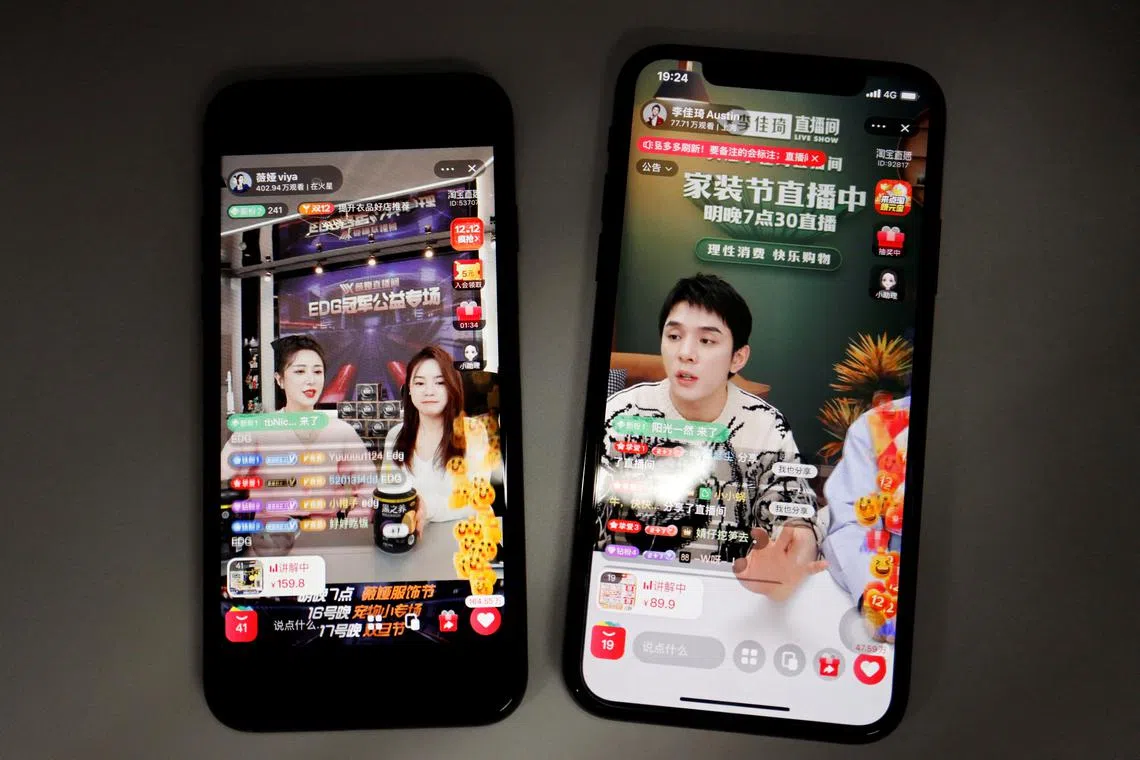China $184 billion Singles’ Day faces stagnation after scandals
Sign up now: Get insights on Asia's fast-moving developments

Livestreaming sessions by Chinese livestreamers Li Jiaqi and Viya were seen on Alibaba's e-commerce app Taobao in 2021.
PHOTO: REUTERS
BEIJING – In 2021, one of China’s most famous Internet celebrities sold about US$1 billion (S$1.4 billion) of products – from shampoo to scarves – in a 14-hour livestream as part of Singles’ Day, the country’s annual e-commerce extravaganza.
This year, the 37-year-old super saleswoman known as Viya will not take part in the world’s biggest shopping event after disappearing from the Internet since being fined for tax evasion.
A slew of other popular livestream stars who have found themselves caught up in President Xi Jinping’s crackdown on celebrity are also likely to be missing in 2022, dulling the glamour and likely hurting the takings of the marathon event that ends on Nov 11.
A slump in consumer confidence from recurring Covid-19 lockdowns
Alibaba, the tech giant that dominates Singles’ Day, is expected to post flat to meagre growth in takings from 2022’s event – Bloomberg Intelligence has even projected an unprecedented fall in the value of its transactions.
Livestream shopping – where people buy products through social media platforms and interact directly with broadcast hosts – had become a part of regular life for millions of consumers. But its growth has collided with a government push to shape Chinese culture and rein in celebrity influence.
President Xi’s “common prosperity” drive, aimed at reining in excess wealth, and the government’s efforts to curb the private sector’s influence have hit some of the biggest names across media and technology.
Customers are wary, too. About three-quarters of consumers say they would watch a livestream or buy items through the sales channel in 2022, down from 97 per cent in 2021, consulting firm AlixPartners reported from a survey of about 2,000 people in China.
“In recent years, livestreaming seems to have created a quick way for brands to get famous and sales (have) boomed,” said Mr Dave Xie, Shanghai-based principal of consultancy Oliver Wyman.
The roughly two-week Singles’ Day bonanza dwarfs similar events around the world. In 2021, millions of shoppers bought what Bain and Co estimates was about 952 billion yuan (S$184 billion) of goods during the event – more than the United States buying spree that spans Thanksgiving through Cyber Monday.
Celebrity scandals
Viya, once seen as the future of shopping, has been the highest-profile casualty in the livestream sector. During her career, she had partnered with Kim Kardashian to host a livestream that sold 15,000 of bottles of the US celebrity’s perfume within minutes.
Her empire came crashing down in December though, when Chinese tax authorities ordered her to pay 1.34 billion yuan in back taxes, late fees and fines. She apologised but has not returned online since.
Li Jiaqi, another top livestream influencer known as the “Lipstick King”, was caught up in a scandal mid-year when a tank-shaped cake appeared in one of his broadcasts on the eve of the anniversary of the 1989 Tiananmen Square crackdown. He vanished from the internet for about three months.
The controversies are helping transform how brands, fearful of being collateral damage if an influencer falls afoul of the government, sell their products in the world’s biggest consumer market.
Companies are setting up their own studios for livestream broadcasts and grooming in-house influencers, who are more easily controlled.
Nike, L’Oreal and Fast Retailing’s Uniqlo, and local labels including Anta Sports Products, have all accrued more than 20 million fans on their company-run livestreaming pages on Taobao, Alibaba’s mammoth online shopping platform similar to Amazon.
Some companies are even doing away with humans entirely. Digitally created influencers are emerging, including Ayayi, who debuted on social platform Xiaohongshu in 2021 and has worked with Tiffany and Co. Forrester Research estimates that 20 per cent of business-to-consumer brands in China will use virtual idols in 2023.
While its brightest stars may have been dimmed, the livestream sector remains core to Chinese consumption – if in an altered form. But the sector’s loss of popular names is likely to ripple beyond just 2022’s Singles’ Day.
“I watched Viya and Li Jiaqi every day last year to buy everything... I just trust their tastes and quality control,” said Ms Jelly Li, a civil servant in Guangzhou. But now, “my interest in livestreaming has been much lowered”. BLOOMBERG


